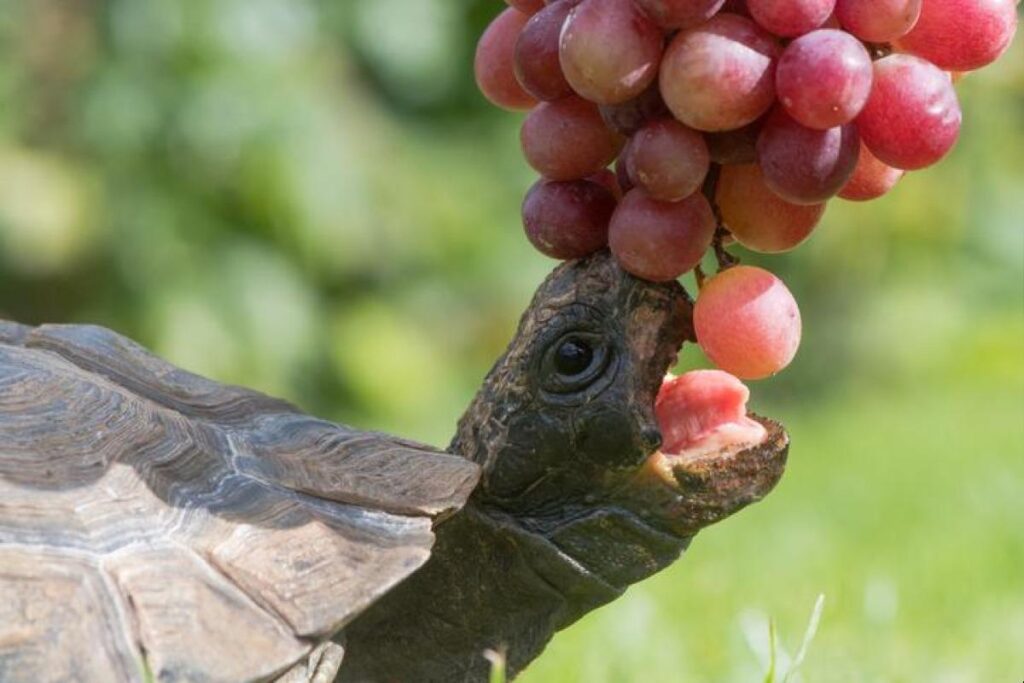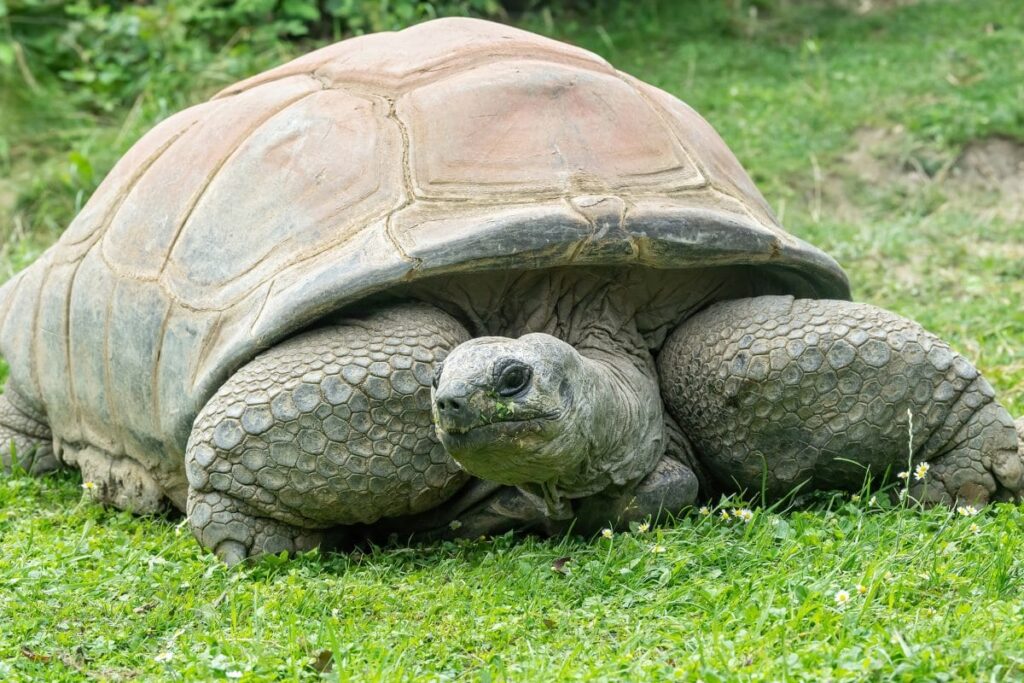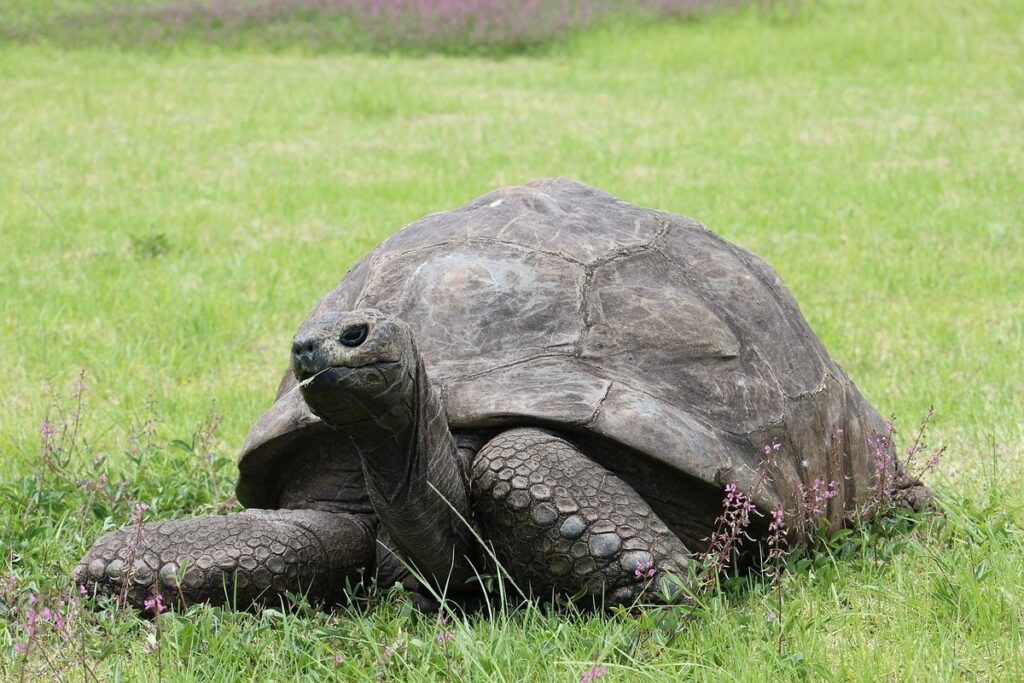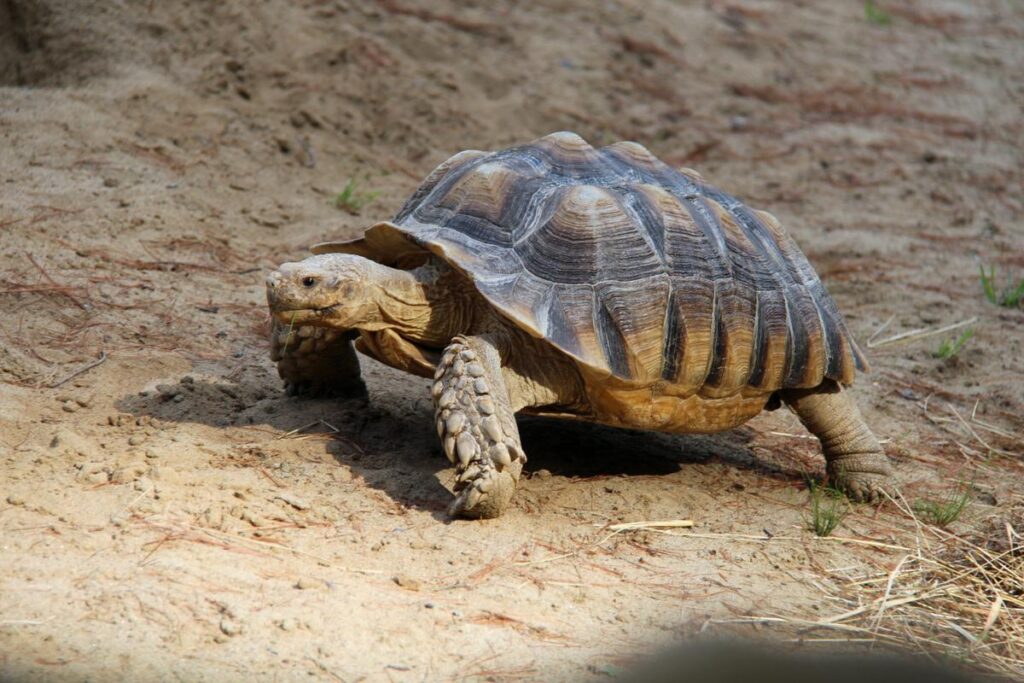Table of Contents
ToggleIntroduction
Can Tortoises Have Grapes? With their ancient and enduring presence on Earth, tortoises are fascinating reptilian companions that have captivated the hearts of many as pets. Responsible tortoise owners understand the importance of providing their shelled friends with a balanced and species appropriate diet to ensure their well-being. One question that often arises when considering the dietary needs of tortoises is whether these gentle creatures can partake in the succulent sweetness of grapes.

Tortoise Dietary Needs
Understanding the Dietary Requirements of Tortoises
Herbivorous Nature: Tortoises are strict herbivores, which means their diet exclusively consists of plant matter. In the wild, they forage for various plant species, including grasses, leafy greens, weeds, and fruits and flowers.
High Fiber: Tortoises require a diet high in fiber, which aids digestion and helps maintain a healthy gut. Their digestive system fits the bill for breaking down fibrous plant material.
Calcium and Phosphorus Balance: Tortoises need a proper balance of calcium and phosphorus to support shell growth and overall bone health. Imbalances can lead to metabolic bone disease.
Variety: Offering a diverse selection of plant species is essential to provide a wide range of nutrients and prevent dietary deficiencies.
Importance Of A Balanced And Species-Appropriate Diet
Shell Health: A balanced diet helps maintain the integrity of the tortoise’s shell, preventing deformities and shell-related health issues.
Growth and Development: Proper nutrition supports healthy growth and development in juvenile tortoises, ensuring they reach their full potential size and strength.
Metabolic Health: Balanced calcium and phosphorus levels are crucial for metabolic processes, including bone formation and muscle function.
Digestive Health: A fiber-rich diet supports healthy digestion, reducing the risk of digestive problems such as impaction.
Longevity and Overall Well-being: Providing the right nutrients in the correct proportions enhances a tortoise’s quality of life and may contribute to a longer lifespan.
Nutritional Content Of Grapes
Water Content: Grapes have a high water content, contributing to their juicy nature. It can help with hydration when consumed.
Sugars: Grapes are naturally sweet and contain sugars, primarily fructose and glucose. These sugars provide quick energy.
Dietary Fiber: Grapes contain dietary fiber, aiding digestion and promoting regular bowel movements.
Vitamins: Grapes are a source of various vitamins, including vitamin C, vitamin K, and some B vitamins.
Minerals: Grapes provide minerals such as potassium, essential for proper muscle and nerve function.
Key Nutrients In Grapes
Vitamin C: Vitamin C is known for its antioxidant properties and role in supporting the immune system. However, tortoises typically obtain sufficient vitamin C from their herbivorous diet.
Water: The high water content in grapes can contribute to hydration, although tortoises usually meet their hydration needs through other sources.
Sugars: Grapes are relatively high in sugars, particularly when compared to the fibrous plant matter that constitutes the bulk of a tortoise’s diet.
Potential Benefits And Drawbacks

Benefits: Grapes can provide hydration and a small dose of vitamins and minerals. The dietary fiber can support digestion. However, Most of these advantages succeed through a tortoise’s diet.
Drawbacks: The primary drawback of grapes in a tortoise’s diet is their sugar content. Tortoises are herbivores adapted for a high-fiber, low-sugar diet. Obesity, gastrointestinal distress, and other ailments are only some side effects of eating too much sugar. Additionally, Grapes are a good choice in moderation to prevent overconsumption.
Can Tortoises Have Grapes?
Discussion on Whether Grapes Are Suitable for Tortoises
Sugar Content: Grapes are naturally sweet due to their sugar content, primarily fructose and glucose. Tortoises have evolved to thrive on a diet mainly consisting of fibrous and low-sugar plant materials. Excessive sugar consumption can lead to obesity, metabolic issues, and digestive problems in tortoises.
High Water Content: While the water content in grapes can contribute to hydration, tortoises generally obtain their hydration needs through other sources, such as freshwater provided in their enclosure. Grapes should keep their primary water source.
Dietary Fiber: Grapes do contain dietary fiber, which can support digestion. However, the high sugar content in grapes can offset the potential benefits of fiber, leading to digestive upset.
Calcium and Phosphorus Balance: The calcium and phosphorus content in grapes is not balanced appropriately for tortoises. Tortoises require a specific calcium-to-phosphorus ratio to support shell health and overall well-being.
Factors To Consider When Offering Grapes To Tortoises
Portion Control
- Keep the serving size extremely small.
- Offer only a tiny piece of the grape as an occasional treat.
- Monitor your tortoise’s consumption closely to prevent overindulgence.
Frequency: Limit how often you provide grapes. They should be offered infrequently, as a special treat on rare occasions.
Freshness: Ensure the grapes are fresh and free from pesticides or chemicals. Wash them thoroughly and remove any seeds which can pose a choking hazard.
Monitor for Reactions: Watch your tortoise closely after introducing grapes to their diet. Some individuals may have digestive sensitivities or allergies to certain foods, so be alert to any adverse reactions.
Dietary Balance: Always prioritize a balanced diet based on the natural herbivorous tendencies of tortoises. Grapes should be considered an occasional supplement rather than a primary food source.
Moderation And Serving Suggestions
Portion Control for Grapes
Tiny Pieces: Cut grapes into small pieces or even halve them if they are small tortoises. These pieces should be manageable for your tortoise to consume without difficulty.
Limited Amount: Offer only a minuscule portion of grapes. A single grape or a tiny slice is sufficient as an occasional treat.
Recommended Serving Methods
Fresh and Clean: Ensure that the grapes are new, free from contaminants, and have cleaned up completely. Remove any pesticides or chemicals by washing them diligently.
Seed Removal: Remove any seeds from the grapes before serving them. The sources can pose a choking hazard and should not become full by tortoises.
Fresh Water Access: Ensure your tortoise can access clean, fresh water in their enclosure. While grapes have some water content, they should not replace their primary water source.
Potential Risks of Overfeeding
Obesity: The sugar content in grapes can contribute to weight gain if consumed excessively. Obesity is a significant health concern for tortoises, as it can lead to various health problems.
Digestive Upset: Tortoises may experience digestive upset, including diarrhea, if they consume too much fruit, primarily due to the sugar content. It’s important to monitor their stool and overall well-being.
Imbalanced Diet: Overfeeding grapes can disrupt the balance of their overall diet, potentially leading to nutritional deficiencies or imbalances. Grapes should manifest themselves as supplementary treats rather than a staple.
Other Foods For Tortoises

List of suitable foods for tortoises
Leafy Greens: Offer a variety of leafy greens, such as collard greens, mustard greens, dandelion greens, and kale. These are rich in fiber and provide essential nutrients.
Weeds: Many tortoises enjoy weeds like plantain, clover, and sow thistle. These can be foraged or grown as part of their diet.
Grasses: Grasses like Bermuda grass, Timothy grass, and fescue are excellent choices for tortoises. Ensure they are free from pesticides.
Hay: High-fiber grass hay, such as Timothy hay, can be provided to mimic their natural foraging behavior.
Diverse Diet Options for Tortoises
Nutritional Variety: Different foods provide a range of essential nutrients, helping to prevent dietary deficiencies.
Enrichment: Offering a variety of foods keeps mealtime interesting for your tortoise, stimulating mental and physical activity.
Preventing Dietary Imbalances: A diverse diet helps maintain the calcium-to-phosphorus ratio necessary for shell and bone health.
Conclusion
With their herbivorous nature and unique dietary requirements, tortoises thrive on a balanced, fiber-rich diet primarily composed of plant matter. Grapes contain some beneficial nutrients and hydration potential and are notably high in sugars. This high sugar content raises concerns about the potential risks of overconsumption, including obesity and digestive upset. As responsible tortoise owners, it is imperative to prioritize the health and well-being of these resilient creatures.







